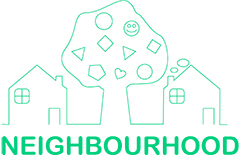Our user survey was conducted for 5 days from 28th April 2018 until the 2nd of May 2018. In total there were 10 questions, out of which 4 of them were optional based on previously selected options.
Our initial plan for the survey was to capture information about interactions between individuals, and also how these may differ, depending on the age and nationality of participants. This would have given us a better understanding of our target audience and also in identifying which country would be ideal startup location for Neighbourhood. However, unfortunately due to a delay in survey approval, and because this aspect clashes with the ethics policy on avoiding the capture of personal data, we dropped the demographic questions.
- Please click this link to see the survey questions.
- Please click this link for the survey data ( Only authorized entry)
Below is the list of questions asked, the aim of each question and the analysis for each of them.
Q1. HOW WELL DO YOU KNOW / INTERACT WITH YOUR NEIGHBOURS?
- The aim of this question was to capture the level of interaction between local communities and individuals belonging to the same locality on a scale of 1 to 5, with 1 being the lowest and 5 being the highest.
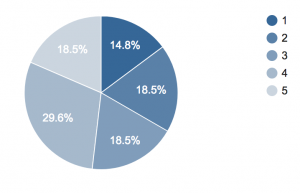
- Based on the analysis of the survey we observe that majority of the responses were rated as 4 indicating a healthy level of interaction between neighbors.
Q2. WHAT SORT OF INTERACTION DO YOU NORMALLY HAVE WITH YOUR NEIGHBOURS?
- The aim of this question was to identify the most common types of interaction that neighbors have.
- Based on analysis of the survey responses we observe that the majority of participants tend to have interactions regarding food, family, social events and common interests.
Q3. WOULD YOU LIKE TO KNOW MORE PEOPLE IN YOUR LOCALITY WHO SHARE SIMILAR INTERESTS WITH YOU?
- The aim of this question was to find out if the participants were interested in meeting people of similar interest or not. Although this question might look simple and straightforward in nature. It still becomes a vital part as this is the USP Neighbourhood. i.e to identify and cluster users with similar taste and interests within a community based on the location proximity.
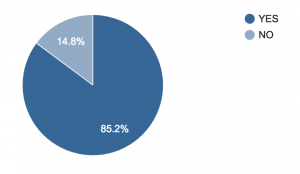
- In our survey we found that 85.2% of the participants responded positively.
Q4. WHAT SORT OF INTERACTION DO YOU THINK HELPS MAINTAIN A STRONG WELL CONNECTED NEIGHBOURHOOD COMMUNITY?
- The aim of this question was to identify the most common types of interaction that encourage neighbors to interact with each other and in turn, maintain a healthy relationship with each other on consent long terms.
- Based on the analysis of the survey we observe that majority of participants believe that interactions regarding social gathering and community events are the key factors which make sure that they maintain those healthy friendly interactions with each other.
Q5.DO YOU THINK YOUR INTERACTIONS / RELATIONSHIPS WITH YOUR NEIGHBOURS COULD IMPROVE OVER TIME BY USING A DIGITAL APPLICATION?
- The aim of this question was to understand potential users trust and believe in digital social media application, to the extent that they facilitate a mode of communication between individuals, at the price of capturing their day-to-day activities and personal data.
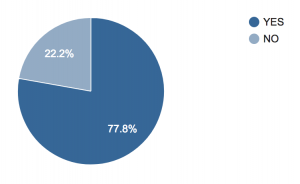
- Based on the analysis of our survey, we were able to identify that many participants believe in the potential for digital social networks as a medium for maintaining friendly interactions with neighbours.
- These below questions (5a, 5b, 5c) are the optional question that arise (were shown to survey participants) based on previously answered questions.
IF YES
Q5a. IS THERE A NEED FOR A NEW DIGITAL APPLICATION TO BE DEVELOPED OR IS THERE AN EXISTING APPLICATION THAT DOES THIS JOB?
- The aim of this question was to identify if participants were willing to trust and try a new social media application as a substitute for the existing applications out there.
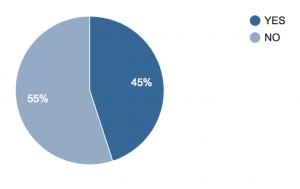
- In our survey 45% of people were willing to try and trust in a new system.
Q5b. COULD YOU SUGGEST SOME FEATURES YOU WOULD LIKE TO SEE IN THIS APPLICATION?
- The aim of this question was to take input suggestions from participants that could be worth implementing in Neighbourhood.
- Based on our analysis we observe that most of the common feature that participants wished to see were related to organizing and suggesting events and regular communication on a day to day basis.
Q5c. COULD YOU NAME SOME PROS AND CONS OF EXISTING APPLICATIONS THAT TRY TO CONNECT PEOPLE BASED ON LOCATION?
- The aim of this question is to support competitor identification and analysis based on some existing applications out there.
- Based on the analysis of our survey we observe that most participants believed in existing systems as being more trustworthy with respect to maintaining data privacy and security and also they believe that such systems were better at authenticating other users as most of them preferred knowing with who they are communicating on a personal basis before having a private communication with them. Which illustrates the importance of personal interaction and mutual friends in the development and success of social media applications.
IF NO
Q5a. WHY DO YOU FEEL SO?
- The aim of this question was to identify the most common reasons why users did not believe in social media applications.
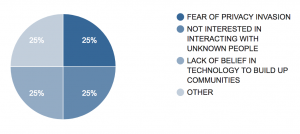
- Based on our analysis we observe that there was a mixed bias of opinions for this question. With the primary idea revolving around lack of trust in technology being a medium of social interaction due to data privacy issues.
Q6. WOULD YOU BE INTERESTED IN USING AN APPLICATION WHERE YOUR DATA IS SECURE AND PRIVATE AND AT THE SAME TIME SUPPORTS HEALTHY INTERACTION WITH YOUR NEIGHBOURS?
- The aim of this question was to understand if users were willing believed in digital social media application if they were given the assurance that their data would be secure and private. Such a situation of lack of trust on security and privacy of personal data cropped up recently after the Facebook Cambridge Analytica data scandal issue that arose recently.
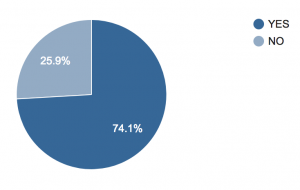
- Based on our analysis we believe that we still have a chance of regaining the trust of users if we guaranteed and illustrated that user data will be kept secure and private.
